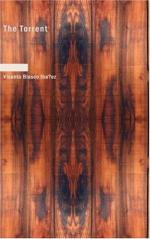And more and more yielding to the lure of the southern sunshine and to those perfumes of May floating about him in wintertime, he turned off into a lane that led to the fields.
As he emerged from the ancient Ghetto and found himself in the open country, he drew a deep breath, as if to imprison in his lungs all the life, bloom and color of his native soil.
The orange orchards lined both banks of the stream with straight rows of green, round tree-tops. The sun glistened off the varnished leaves; the wheels of irrigating machines sounded from the distance like humming insects. The moisture rising from the canals, joined the clouds from the chimneys of the motors, to form a thin veil of mist over the countryside, that gave a pearly transparency to the golden light of the afternoon.
To one side rose the hill of San Salvador, its crest topped with the Hermitage, and the pines, the cypresses, and the prickly pears around that rough testimonial of popular piety. The sanctuary seemed to be talking to him like an indiscreet friend, betraying the real motive that had caused him to evade his appointment with his political friends and disobey his mother into the bargain.
Something more than the beauty of the fields had enticed him from the city. When the rays of the rising sun had awakened him that morning on the train, the first thing he had seen, before opening his eyes even, was an orange orchard, the bank of the Jucar, and a house painted blue,—the very one that was now in sight away off there, among the round tree-tops along the river.
How many times in past months his thoughts had lingered on the memory of that same scene!
Afternoons, in the Congress, while the Premier on the Blue Bench would be answering the interpellations of the Opposition in sharp incisive tones, Rafael’s brain would begin to doze, reduced to jelly, as it were, by the incessant hammering of words, words, words! Before his closed eyes a dark veil would begin to unroll as if the moist, cellar-like gloom in which the Chamber is always plunged, had thickened suddenly, and against this curtain, like a cinema dream, rows of orange-trees would come into view, and a blue house with open windows; and pouring through the windows a stream of notes from a soft voice, ever so sweet, singing lieder and ballads as an accompaniment to the hard, sonorous paragraphs snapping from the Premier’s teeth. Then applause and disorder! The moment for voting had arrived, and the fading outlines of the Blue House still hovering before his dreamy eyes, the member for Alcira would ask his neighbor:
“How do we vote? Yes or no?”
The same it was at night at the Opera, where music served only to remind him of a familiar voice winding like a thread of gold out across the orchards through the orange trees; and the same again, after dinner with his colleagues on committees, when the deputies, their cigars tilted cockily upwards between their lips, and with all the voluptuous gaiety inspired by good digestions, would troop off to see the night out in some trustworthy house of assignation where their dignity as representatives of the country would not be compromised!




